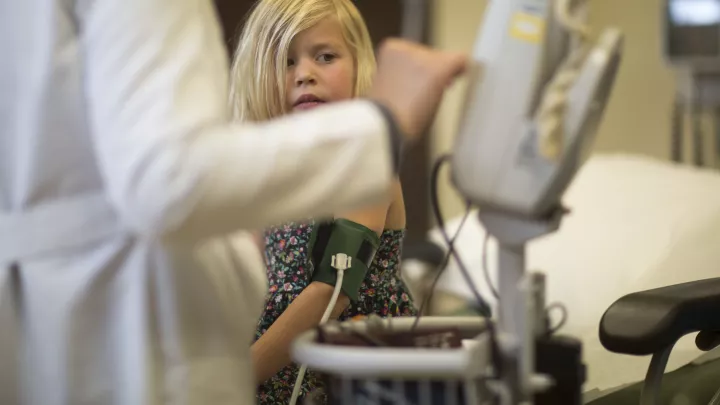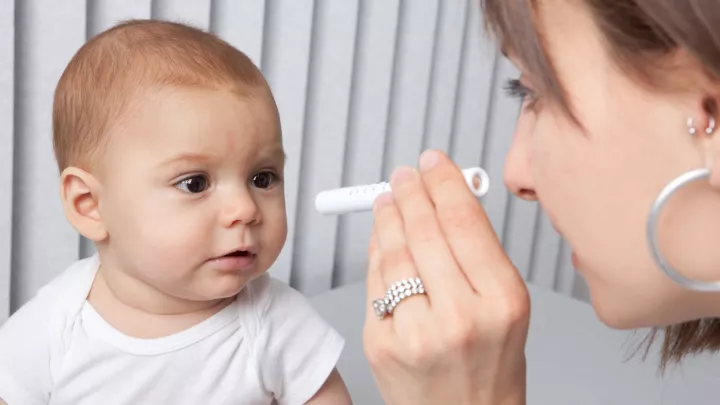
Prepare for your child’s cardiology visit with a list of questions for their provider.
Four Key Questions to Ask at Your Child’s First Cardiology Visit
If your pediatrician recommends that your child see a cardiologist, you may feel concerned and unsure of how to prepare. Doing a little homework before your first appointment can give you peace of mind. It will also ensure your child receives the best care possible.
Start by checking to see if your provider is Board-certified in pediatric cardiology with the American Board of Pediatrics, like the specialists at the Heart Institute at Children’s Hospital Los Angeles. Our top-ranked pediatric cardiology providers care exclusively for children and have expertise in diagnosing and treating any heart condition.

“A specialty pediatric cardiac center has comprehensive testing capabilities and can reach a clear diagnosis within one or two visits,” says Paul F. Kantor, MBBCh, MSc, FRCPC. Dr. Kantor serves as the Chief of Cardiology and co-Director of the Heart Institute at CHLA.
A fast and accurate diagnosis ensures your child begins treatment quickly. You can speed up the process by bringing some helpful information to your cardiology appointment, including:
- Your child’s complete family medical history (siblings, parents, and grandparents)
- Your pediatrician’s concerns about your child’s heart
- Printouts of blood tests or other advanced testing results if the child has been seen by another cardiologist
According to Dr. Kantor, it’s a good idea to write down a list of questions to ask your cardiologist during that first visit. Here are his top four to consider:
1. What heart problem does my child have?
“There are several different categories of heart problems,” says Dr. Kantor. “Heart murmurs are common reasons children see a cardiologist, and they are often harmless. Children can have congenital heart defects, which affect the structures of the heart, the heart valves, or blood vessels, and develop during pregnancy. We also treat children for heart muscle disorders and heart rhythm abnormalities.”
Understanding your child’s heart condition will help you make informed decisions about their care.
2. Why does my child have a heart condition?
Heart problems can have many causes, and sometimes the cause is unknown.
If you have a family history of heart problems, genetics could play a role in your child’s condition. Other factors include:
- Bacterial or viral infections, which can lead to myocarditis (a rare condition that affects the heart muscle)
- Environmental toxins, which can impact the cardiovascular system in the womb or during early childhood
- Lifestyle factors like poor diet, smoking/vaping, and lack of exercise
Discuss possible causes with your cardiologist. When you know the reason for your child’s condition, it’s easier to watch for and prevent potential risks to their health.
3. What are the treatment options?
Your child’s cardiologist may recommend a particular treatment or discuss a range of treatment options with you. Ask them about the benefits and risks of each option.
Although most children do not need surgery for a heart problem, in some cases it may be necessary. Ask about the Center’s surgical capabilities and experience.
A dedicated pediatric heart center like the Heart Institute at CHLA provides advanced technology and the latest surgical treatments for your child’s condition.
“CHLA is home to some of the finest heart surgeons in the country,” says Dr. Kantor. “We can provide the treatment a child needs right here, without the need for a referral to another center.”
4. How can I help protect my child’s heart health?
According to Dr. Kantor, instilling healthy habits early in your child’s life leads to better heart health in adulthood. “We spend a lot of time talking with parents about adopting a heart-healthy lifestyle,” he says. “In addition to patients with existing heart conditions, we see children who are at risk of future problems due to lifestyle habits.”
Dr. Kantor recommends asking your cardiologist how to incorporate these four pillars of a heart-healthy lifestyle:
- Follow a healthy diet: Sugar and processed foods are linked to several health conditions that can affect a child’s heart and cardiovascular system. These include obesity, metabolic syndrome, and gut problems. Find out if your provider offers nutritional support or resources to help your family make healthy food choices.
- Get regular exercise: Children need about an hour of exercise six days per week for optimal heart health. At CHLA, you have access to physical therapists who can assess your child’s activity level and create a personalized exercise plan.
- Avoid vaping and smoking: According to research, over 25 percent of children use e-cigarettes and vaping products by their senior year of high school. Vaping and smoking expose your child to high-risk toxins that damage their blood vessels and lungs. If your child vapes, ask your cardiologist for strategies to help them quit.
- Limit screen time: Excessive screen time is associated with a range of health problems, including mental health disorders, sleep issues, obesity, and metabolic syndrome. Talk with your cardiologist about age-appropriate screen time limits for your child.
Receive expert care from specialists in pediatric cardiology
If you need a pediatric cardiologist, our team of specialists is here to help, with renowned expertise and compassionate care. The Heart Institute sees patients from across the United States and more than 75 countries. U.S. News & World Report ranks our cardiology and heart surgery programs among the top in the nation.


